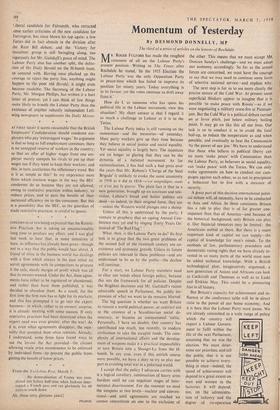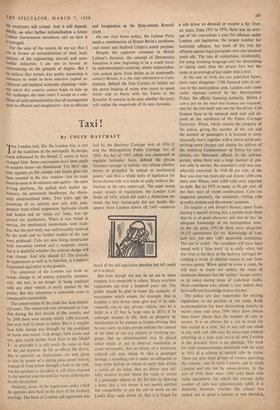Momentum of Yesterday
MR. ROGER FULFORD has made the roughest comment of all on the Labour Party's present position. Writing to The Times after Rochdale he stated, 'In the 1955 Election the Labour Party was the only-Opposition Party in peace=time which has failed to improve its position for ninety years. -Today everything is in its favour, yet the votes continue to drift away from it.'
How do I, as someone who has spent his political life in the Labour movement, view this situation? My short answer is that I regard it as much a challenge to Labour as it is to the Tories.
The Labour Party today is.still running on the momentum—and the memories—of yesterday. Most party workers give up their time because they believe in social justice and social equality. Yet social equality is largely here. The injustices are no longer so glaring that they can be the dynamic of a national movement. As for nationalisation, it has had such a bad press over the years that Mr. Robens's 'Charge of the Steel Brigade' is unlikely to evoke the same unanimity in 1958 as it did in 1854—c'est magnifique, awls ce n'est pas la guerre. The plain fact is that to a new generation, brought up on icecream and tele- vision, Labour's bread and butter politics are dead—as indeed, in their original form, they are —unless the Western world plunges into a slump.
Unless all this is understood by the party, I venture to prophesy that an ageing Annual Con- ference may yet end by singing 'Forty Years On' instead of 'The"Red Flag.'
What, then, is the Labour Party to do? Its first task is to grasp that the two „great problems of the second half of the twentieth century are co- existence and economic growth. Unless its future policies a:re relevant to these problems—and are understood to be so by the public—the decline will continue.
For a start, we Labour Party members need to clear our minds about foreign policy, because this sets the framework for all policies. Despite the Brighton decisions and Mr. Gaitskell's recent admirable speech in Parliament, the public im- pression of what we want to do remains blurred.
The big question is whether we want Britain to remain a world political power, or contract out to the cosiness of a Scandinavian social de- mocracy, or become an international 'softie. Personally, I have no doubts. Our country has contributed too much, too recently, to modern civilisation to take the escapist roads. The com- plexity of international affairS and the develop- ment of weapons make it a practical impossibility to turn Britain into a Shangri-La from the H- bomb. In any case, even if this ostrich course were possible, we have a duty to try to play our part in avoiding total war in a polarised world.
I accept that the policy I advocate carries with it a logical corollary, continuation of heavy arms burdens until we can negotiate stages of inter- national disarmament. For the moment we need the weapons at two levels—nuclear and conven- tional—and until agreements are reached we cannot concentrate on one to the exclusion of the other. This means that we must accept Mr. Duncan Sandys's challenge—and we must adapt our economy accordingly. So far as the armed forces are concerned, we must have the courage to say that we may need to continue some form of selective national service—and explain why.
The next step is for us to see more clearly the precise nature of the Cold War. At present some superficial thinkers appear to imagine that it is possible 'to make peace with Russia'—as if we were negotiating a military cease-fire at Panmun- jom. But the Cold War is a political debate carried on at fever pitch, just below military boiling point. It may go on like this all our lives. Our task is so to conduct it as to avoid the fatal boil-up, to reduce the temperature as and when possible; and eventually to beat the Communists 'by the power of our jaw.' We have to understand that those who believe in political liberty can no more 'make peace' with Communism than the Labour Party, as believers in social equality. can 'make peace' with the Tories. We can only make agreements on how to conduct our cam- paigns against each other, so as not to precipitate a holocaust but to live with a measure of security.
A great part of this decisive international politi- cal debate will, of necessity, have to be conducted in Asia and Africa. In these continents Britain, has a role to play that is of far greater con- sequence than that of America—and because of the historical background, only Britain can play it. Our financial resources may be limited : the Americans outbid us there. But there is a more important kind of capital we can supply—the capital of knowledge for men's minds. To the methods of law, parliamentary procedure and democratic voting rights that we have already in- vested in so many parts of the world must now be added technical knowledge. With a British technological plan, imaginatively organised, a new generation of Asians and Africans can look to Cockcroft and Thomson as well as to Laski and Erskine May. This could be a pioneering feat in all history. the employers will extend. And it will depend, thirdly, on what further nationalisation a future Labour Government introduces and on how it is managed.
For the sake of the record, let me say that I am in favour of nationalisation of steel, land, sections of the engineering, aircraft and auto- mobile industries. I am not in favour of nationalising on the grounds of dogma. But I do believe that certain key public ownership is necessary in order to have selective capital in- vestment and national economic planning—with- out which this country cannot begin to take up the challenges she must meet I accept as a con- dition of such nationalisation that all management must be efficient and imaginative—just as efficient and imaginative as the State-owned Renault plant. • On our vital home policy, the Labour Party needs a combination of Ernest Bevin's earthiness and vision and Stafford Cripps's moral purpose.
Despite the apparent recession in British Labour's dynamic, the concept of Democratic Socialism is now beginning to be a world force. In underdeveloped countries, where industrialisa- tion cannot grow from below as in nineteenth- century Britain, it is the only alternative to Com- munism. Behind the Iron Curtain its beliefs are the secret longing of many who yearn to speak freely and to break with the Tories in the Kremlin. It remains to be seen whether the party will realise the magnitude of its new dynamic.



































 Previous page
Previous page